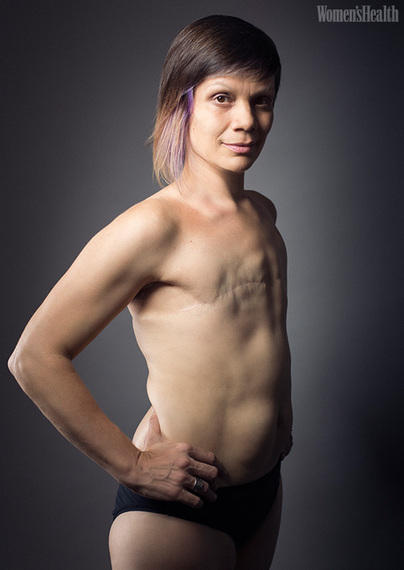Naturally Flat Post-Mastectomy
 |
"Reconstruction is not a simple process."
"Some women just feel like it's too much: It's too involved, there are too many steps, it's too long a process."
Dr. Deanna J. Attai, California breast surgeon
"That's the dirty little secret of breast reconstruction: The risk of a major complication is higher than for the average elective surgery."
Dr. Clara Lee, associate professor of plastic surgery, Ohio State University
"Having something foreign in my body after a cancer diagnosis is the last thing I wanted."
"I just wanted to heal."
Debbie Bowers, 45, Pennsylvania
"I was never told there was a choice. I went from the breast surgeon to the plastic surgeon, and they said, 'This is what you're going to do'."
Marianne DuQuette Cuozzo, 51
"[Focusing on the risk of complications with breast reconstruction is similar to focusing on plane crashes since] millions of flights land safely."
"Taking into consideration advances in surgical techniques] the aesthetic result can be better than the native breast."
Dr. David H. Song, chief of plastic surgery, University of Chicago
"It's a tremendous amount to put your body through, and it's not like we're going to get our breasts back."
"They [her reconstruction post-mastectomy] don't look or feel, in most cases, like our breasts [so she had the implants later removed]."
Rebecca Pine, 40, cancer survivor, New York
"A lot of the women in my support group had infections, and they were surprised at how many surgeries were involved."
"As I compared notes, I wondered, 'Why are all these women doing this to themselves'?"
Alicia Staley, 45, double-mastectomy
 |
| The Huffington Post |
Dr. Marisa Weiss is the founder of breastcancer.org. She feels that doctors should not make the assumption that all their patients wish for reconstruction. "I've had go-go dancers who do not want reconstruction, and nuns who say, 'I need reconstruction'". But the very fact is that oncologists seem to sponsor the work done by plastic surgeons in breast reconstruction. If both are male, viewing the situation from the typical male perspective, it is a telling conclusion.
Some surgeons have the tone-deaf gall, as Dr. Song did, to extol the virtues of breast reconstruction as an improvement over the original equipment that nature designed. As though a woman should appreciate a silicone implant sized and shaped to perfection over her own natural breast size and shape; perhaps some do, and certainly many would not. The implant is not a living part of the body, but an intruder. One that requires additional surgery which sometimes does not have the outcome promised.
So the promotion of breast reconstruction to enable women to "feel whole again", sounds like a public relations ploy to sell a dubious product in a society that has aesthetic standards for women to squeeze themselves in to, irrespective of whether this is what they really want. Many have no idea what they really want, they simply accept what they have been guided toward. And afterward, some women discard the end-product of that guidance.
Some women become accustomed to seeing themselves with scarred flat chests replacing their body shape that women are so affectionately proud of. It is a recognition of reality and the price one pays to recover from a dread disease. Dr. Attai points out that some of her patients, in particular those who originally had small breasts to begin with, are choosing to go the 'flat' chest way. And perhaps that choice falls within a middle-aged group, rather than a younger cohort of women undergoing surgery.
"Breasts aren't what make us a woman", stated Paulette Leaphart, 50, of New Orleans. She had a clotting disorder that obviated the possibility of reconstruction after a double mastectomy for medical-health reasons. She walked from Mississippi to Washington to raise awareness about the financial struggles faced by cancer patients. She did this during the summer months, topless, to bring attention to her focus.
Society has certain mores and expectations, and they come about as standard procedures when enough people accept them. Medical professionals have accepted the theory that part of breast cancer treatment includes restoration of the breast. The Women's Health and Cancer Rights Act of 1998 in the U.S. requires health plans to cover the cost of prosthetics and reconstruction procedures. But is it truly a requirement that all women must embrace?
Labels: Cancer, Health, Social-Cultural Deviations, Surgery

0 Comments:
Post a Comment
<< Home